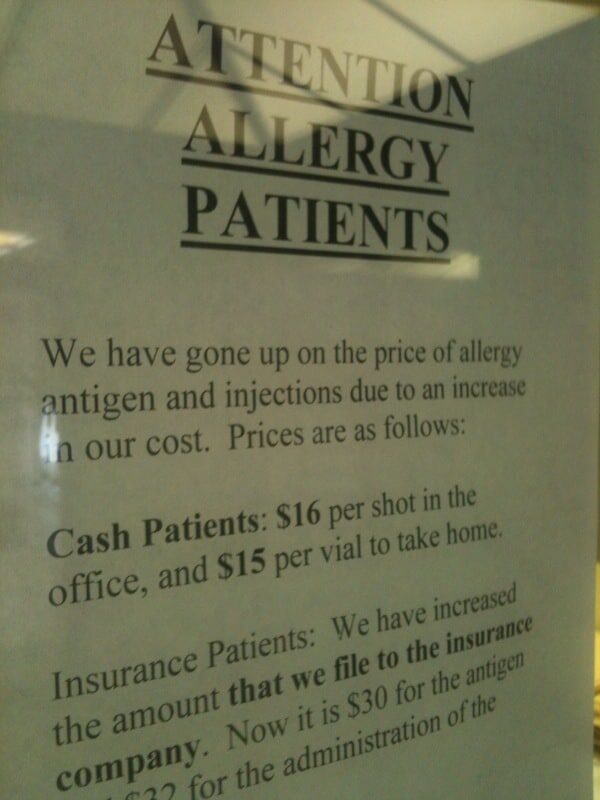A common theme I've written about from the start of my blogging days is the Lean/Toyota notion that price is dictated by the market (the customers) — price is NOT something you can set in isolation based on your costs. Here are some earlier posts of mine on this topic.
The old notion, which flies in the face of basic economics, is that you took your costs (assuming you know them accurately) and then add a profit margin that you feel entitled to. So the Price = Cost * (1 + Profit Margin).
This only works if you are a true monopoly producer. But, far too many companies claim they “have” to raise prices to you, the customer, because of cost increases on their side. This even happens in medicine. Even at Toyota, at times.
Let's say the market says the price for your product is $100. If your costs are $80, then you have a profit margin of $20.
If one of your input costs (materials or labor) goes up by $5, you cannot necessarily just raise your price to $105. Your job, from the classic Toyota perspective, is to eliminate waste to find $5 in other cost reduction if you want to keep your margin the same.
Think about it reverse… if you could reduce your costs by $5, would you automatically pass along a $5 price reduction to your customers? You might if you were trying to aggressively grow market share at the expense of competitors who charge $100 or if you had excess capacity that might otherwise sit idle.
Either way, pricing decisions (effective ones) are more complicated than simple addition based on an entitlement profit (Price = Cost + Entitlement Profit Margin). We “deserve” to make a profit, some might say, leading to that term entitlement.
Here is a picture from a recent visit to my doctor (where I was a patient at this specialist):
They are playing that same game of trying to convince the customers that they “have” to raise prices. If the patient is willing to absorb the higher price (choosing not to find another doctor or to quit getting shots), then maybe they should have been charging that higher price all along (if the market will bear it)?
I think companies (and doctors offices) get away with this practice since customers accept it and often don't push back (maybe because their business is trying to do the same thing to their customers???). What a racket! :-)
I'd prefer to see the doctor's office reduce waste and take out cost to counter that increase in antigen prices….
What do you think?
Some of my favorite older posts on this topic, including some cases where companies, like Parker Hannifin and P&G “get it”:
-
Starbucks Pricing on Cost or Value??
-
Tesco Understands Economics
-
Toyota Raises Prices – Yep, That Same Excuse
-
“Successful” “Lean” Company “Forced” to Raise Prices
-
Using Lean and Cost Reduction to Counter Rising Materials Costs
-
P&G and Target Pricing
-
Parker Hannifin and Market Driven Pricing
If you’re working to build a culture where people feel safe to speak up, solve problems, and improve every day, I’d be glad to help. Let’s talk about how to strengthen Psychological Safety and Continuous Improvement in your organization.










Thinking as a patient, not necessarily as a leanster, my priorities for my healthcare are 1) quality of care, 2) convenience, and 3) price. I’m sorry to say that I’ve caved in to the notion that I’m going to be paying through the nose for healthcare no matter where I go (although we all know how much the system is broken and that it could be much better), and if I have a doctor who I believe has been giving me excellent care – getting great results – I’m going to that doctor even if it may be significantly more expensive than another. Also, knowing that my health insurance policy has an out of pocket maximum, and that I’m going to take advantage of the flex plan to reduce the actual amount I pay out of pocket, I know I’ll pay no more than X amount in a given year. Not good for keeping healthcare costs in general down, I know, but this is what works best for me as a patient/customer.
Yes, there is a lot of fixing that needs to be done.
While I understand your business point, perhaps the doctor’s office differs greatly from other businesses. Physicians have many costs that they cannot decrease. These costs come from government and insurance company mandates. These costs increase while payments (yes payments not reimbursements) from government and insurance companies are fixed. Physicians cannot (unless the move to either retainer medicine or cash only practice) charge more for an office visit.
I understand your frustration, and the sign if a poor one, but physicians live in a socialized system that markedly handicaps their ability to run their business.
Healthcare certainly is a screwy “market”!!
To me, the “market” is the issue. Most people don’t know the cost of their healthcare (especially primary care), so it’s difficult to shop based on price. If Wal-Mart raises prices, you can go to Target or K Mart and get the exact same product for a lower price. If Dr. X raises prices, how do you know if Dr. Y is cheaper? And if he is, is his/her quality as good? A screwy “market” indeed.
Well, that was very interesting – it does depend on what you are doing as a business and the leverage that you have. Doctors can be frustrating – you have an appointment, get there on time – and they make you wait because they are behind – and you never get a price break either. We are induction heat treaters (www.zioninduction.com) so the service we provide is hardening or softening of metal components (made by our customers) that wind up in all kinds of things like autos, recreational vehicles, lawn and garden equipment, mining equipment, etc. Our business is directly related to the health of manufacturing in the US. The automotive industry has a reputation for making you lower your pricing an “industry average” of up to 3% each year. So you have to be able to constantly find ways to reduce your costs – usually through the gains found with increased efficiencies. At some point the very nature of how you get business done has to change. We have been very fortunate to remain highly diversified in the scope of industries that we work with. But due to the overall “pressure” out there for constant improvement, we’ve undertaken an ABC approach (Activity Based Costing) that forces us to look at every aspect of our business and where and how can we improve. The culture here at Zion Industries is of continual improvement and it has helped us to gain in market share by being more competitive on our quotes over time. But where does it end ? Is there an end ? How can developed countries’ industries compete with emerging market countries in the long run ? We have seen so much manufacturing leave the US for China – in just the last 5 years – and now with the recent strikes in China, there’s talk about moving mfg. out of China to places like Vietnam because they could be even cheaper. How much more mfg. can we afford to lose – will it ever come back to the US like it once was ?
[…] Doctor’s Office Raises Price Because They Can? dal Lean Blog di Mark Graban: Il medico e le aziende “forzate” ad aumentare i prezzi perché i loro costi sono saliti… (traduzione automatica) […]
I think the prices are too low as it is. I have to wait weeks sometimes to see my primary care. Obviously demand has out weighed supply.
I’d gladly pay extra to actually be seen.
Nate, you can probably find a “concierge medicine” practice that doesn’t take insurance… you can (in the U.S.) “pay extra to actually be seen.”
http://www.google.com/search?sourceid=chrome&ie=UTF-8&q=concierge+medicine